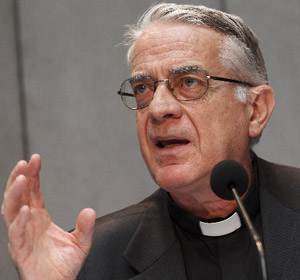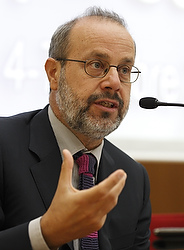By Cindy Wooden
Catholic News Service
October 5, 2010
http://www.catholicnews.com/data/stories/cns/1004072.htm
 |
| Jesuit Father Federico Lombardi (CNS file/Paul Haring) |
The clerical sex abuse crisis was a serious proving ground for the Catholic Church and its commitment to be open and honest with the world about the failures of its members, the Vatican spokesman said.
"There was a great loss of trust in the church -- partially justified, partially caused by a negative and incomplete presentation of the problem -- but this damage, as the pope said, can be overcome with good if we move in the direction of a profound purification and renewal" so that no one is ever again abused by a priest or church worker, said Jesuit Father Federico Lombardi, the Vatican spokesman.
Father Lombardi, who directs the Vatican press office, Vatican Radio and the Vatican television center, spoke Oct. 5 to Catholic communicators from 83 countries gathered at the Vatican for a congress on the Catholic press.
The only way to promote church unity in the midst of controversies and protect the freedom of expression and truth in the church is to be credible and transparent, the Jesuit said.
"The serious sex abuse crisis certainly was a test, a fundamental testing ground, for the credibility of the church" and its ability to enact serious changes, he said.
Father Lombardi said the church also must learn to be as open and transparent in answering questions about its finances, since many people in the world still think the Vatican is rolling in cash.
"A church that is credible before the world is a church that is poor and honest in the way it uses its resources, able to give an account of how it uses them" and able to prove that its financial dealings are legal and transparent, he said.
Father Lombardi added that he is convinced of the honesty of the Vatican bank, which was being investigated by Italian authorities in late September, but that more transparency earlier would have made that clear.
John Thavis, Catholic News Service's Rome bureau chief, told the congress that Catholic journalists in the United States "have been on a learning curve" over the past 20 years in dealing with reports of clerical sex abuse and with the bishops' attempts to deal with accusations and establish prevention programs.
When the crisis began in the 1990s, he said, many Catholic newspapers hesitated to cover the story, but when the scandal in the United States hit a real crisis point in 2002, there was a real shift, "first, because many in the Catholic press shared the sense of outrage over these disclosures."
As the scandal erupted in Europe at the beginning of 2010 and many secular newspapers seemed to try to lay the blame at the feet of Pope Benedict XVI, the Catholic press knew that the pope had been "methodical and determined and patient" in trying to deal with the problem since the 1990s, he said.
"What worries me," he said, is that Catholic communicators "have not really had much impact beyond their own limited audience" in informing people about what the church has done in the last 20 years to deal with the crisis and to let people know that the vast majority of cases being reported on today regard abuse that took place decades ago.
 |
| Giovanni Maria Vian addresses the Catholic Press Congress at the Vatican Oct. 5. (CNS/Paul Haring) |
Giovanni Maria Vian, editor of the Vatican newspaper, L'Osservatore Romano, said the goal of the Catholic press has to be "information and formation," letting people know what is happening in the church and the world, promoting a civilized conversation about it and giving people the tools to do something about it.
What should make Catholic newspapers different, he said, is its "Catholic vision," both in the sense of having a universal breadth -- "presenting different voices and different continents" -- and reflecting "the Christian tradition according to the church of Rome."
The Catholic press does have a responsibility to inform and form Catholics, but also must try "to speak to those outside the church in friendship," Vian said.
To communicate effectively to all parts of the church and to surrounding society, the Catholic press must use "a language that is not only for the initiated.... If we speak only with a language that we alone understand, we won't be heard."
Vian said it is obvious the Vatican has made mistakes in its attempts to communicate, including recently. But "the Holy See, at least since the time of Pope Pius XI (1922-1939) has been at the vanguard of mass communications" with multilingual editions of Vatican Radio and L'Osservatore Romano, the Vatican website and the Vatican Television Center.
Jaime Coiro Castro, director of communications for the bishops' conference of Chile, brought with him a Chilean flag signed as a witness of continued survival and well-being by the 33 miners who have been trapped underground in the San Jose mine since early August.
"I dream of a Catholic press that is happy to write, like these miners," he said.
The Catholic press must be a vehicle of communication for and with the thousands of people who "need to be heard and treated with dignity and respect. In that way we will be a responsible and respectful voice in public dialogue," Coiro said.
Any original material on these pages is copyright © BishopAccountability.org 2004. Reproduce freely with attribution.